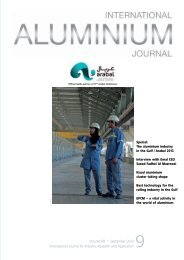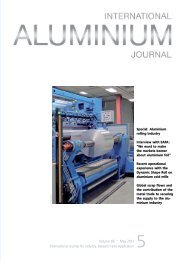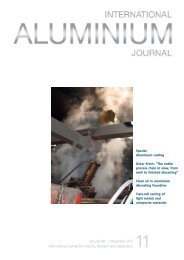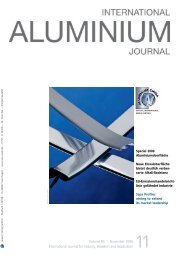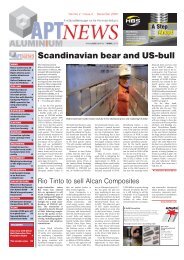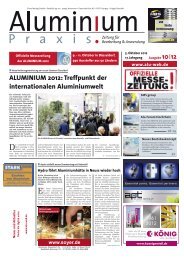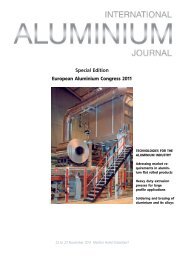special - Alu-web.de
special - Alu-web.de
special - Alu-web.de
You also want an ePaper? Increase the reach of your titles
YUMPU automatically turns print PDFs into web optimized ePapers that Google loves.
ALUMINIUM MI DDL E EAST<br />
Advancements in reduction technology improve specific energy<br />
consumption and reduce greenhouse gas emissions at Dubal<br />
© Dubal<br />
Established to add value to the energy resources<br />
of the Emirate, Dubai <strong>Alu</strong>minium<br />
(Dubal) began operating in November<br />
1979 and has since been a substantial<br />
contributor to the national and regional<br />
economy. Today, Dubal operates the<br />
world’s largest single-site smelter using<br />
pre-bake technology: 1,573 reduction<br />
cells arranged in seven potlines produce<br />
over one million tonnes of molten aluminium<br />
a year (2012: 1,025,266 t), the<br />
bulk of which (about 88%) is exported<br />
to close on 300 customers in 57 countries<br />
around the world.<br />
The <strong>de</strong>mand for electrical power to maintain<br />
this production level is about 1,900 MW. This<br />
is more than met through Dubal’s captive<br />
combined cycle power station, which has an<br />
installed power generation capacity of 2,350<br />
MW (at 30 °C). While Dubal’s gas turbines<br />
are fuelled primarily by natural gas, for which<br />
DX+ pilot line<br />
supply is available, the cogeneration and combined<br />
cycle configuration of the Dubal Power<br />
Plant means that approx. 36.8% of the power<br />
generated at Dubal is fuel-free: a position that<br />
reflects the company’s <strong>de</strong>ep-seated awareness<br />
of the energy-intensive nature of aluminium<br />
smelting and its associated corporate commitment<br />
to energy optimisation across its operations.<br />
This commitment is evi<strong>de</strong>nt in the inherently<br />
responsible expansion of Dubal’s smelter<br />
complex over the years. The fledgling smelter<br />
complex, built on a 480 hectare site in Jebel<br />
Ali, 35 km from the city of Dubai, comprised<br />
360 Kaiser P69 cells arranged in three potlines.<br />
An ongoing quest for sustainable, organic,<br />
innovation-based growth, led to the cells in<br />
these potlines being upgra<strong>de</strong>d to D18 technology.<br />
A fourth potline of 144 cells was built in<br />
1990 and further cells were ad<strong>de</strong>d in 2008 and<br />
2010, bringing the total number of D18 cells<br />
at Dubal to 520. At the same time, a series<br />
of other expansion projects were completed<br />
between 1998 and 2008 – each phase incorporating<br />
more advanced reduction technologies<br />
that operated at higher amperage levels and<br />
thus produced more metal per unit of power<br />
consumed.<br />
Driven to achieve operating excellence<br />
through continuous improvement, Dubal simultaneously<br />
invested substantial resources<br />
in advancing its aluminium smelting processes<br />
and technologies with the aim of not only increasing<br />
productivity, but also reducing the<br />
impact of its smelter operations on the environment<br />
– the latter through improved energy<br />
efficiency and minimised emission of levels.<br />
In essence, lower energy consumption would<br />
mean reduced <strong>de</strong>pletion of fossil fuels and an<br />
associated <strong>de</strong>cline in carbon dioxi<strong>de</strong> (CO2)<br />
produced during the combustion of these<br />
fuels; while enhanced process control would<br />
curtail emissions of other greenhouse gases –<br />
specifically perfluorocarbons (PFCs).<br />
This quest culminated in the <strong>de</strong>velopment<br />
in 2005 of Dubal’s proven in-house <strong>de</strong>veloped<br />
DX technology – a UAE flagship technology<br />
that has been installed in a <strong>de</strong>dicated 40-cell<br />
potline at the Dubal smelter in Jebel Ali, Dubai;<br />
and in the 756-cell first phase of Emirates<br />
<strong>Alu</strong>minium (Emal) in Al Taweelah, Abu<br />
Dhabi. The amperage of the DX cells at Dubal<br />
was ramped up from 340 kA at start-up to<br />
380 kA within the first two years of operation.<br />
Operating stably at this level, these cells<br />
produce 2.91 tonnes of aluminium per pot<br />
per day at exceptionally high purity levels of<br />
99.92%, with specific energy consumption<br />
of 13.2 kWh/kg of aluminium produced and<br />
current efficiency of 95.2%. These performance<br />
parameters translate into measurable<br />
energy conservation and associated operating<br />
cost reductions, as well as reduced environmental<br />
impact through lower fossil fuel<br />
consumption. The DX cells at Emal<br />
Phase I, which began operating at<br />
350 kA, now also operate at 380 kA<br />
– giving an production capacity of<br />
800,000 tonnes a year.<br />
While extremely proud of DX<br />
technology, Dubal’s hunger for continuous<br />
improvement has not been<br />
satiated. To the contrary, ongoing<br />
R&D activities at Dubal have resulted<br />
in a re-<strong>de</strong>sign of the DX cells to<br />
enable operating at even higher amperages.<br />
Five new generation cells –<br />
known as DX+ technology and<br />
another UAE flagship innovation –<br />
were built in a pilot line at Dubal’s<br />
Jebel Ali smelter and began operating<br />
at 420 kA at the end of August<br />
2010. The amperage of these pilot<br />
cells has since gradually increased<br />
and reached 440 kA in February<br />
2012, with stable results. Daily output<br />
is 3.37 tonnes of aluminium per<br />
pot, at purity levels of 99.93%, with specific<br />
energy consumption of 13.27 kWh/kg of aluminium<br />
produced. Ultimately, DX+ cells are<br />
expected to operate at 460 kA.<br />
Based on its <strong>de</strong>monstrated performance,<br />
DX+ technology has been licensed to Emal<br />
Phase II, where a single 444-cell potline is<br />
currently un<strong>de</strong>r construction. At this industrial<br />
scale, DX+ is targeted to achieve specific energy<br />
consumption of less than 13.33 kWh/kg<br />
34 ALUMINIUM · 3/2013



